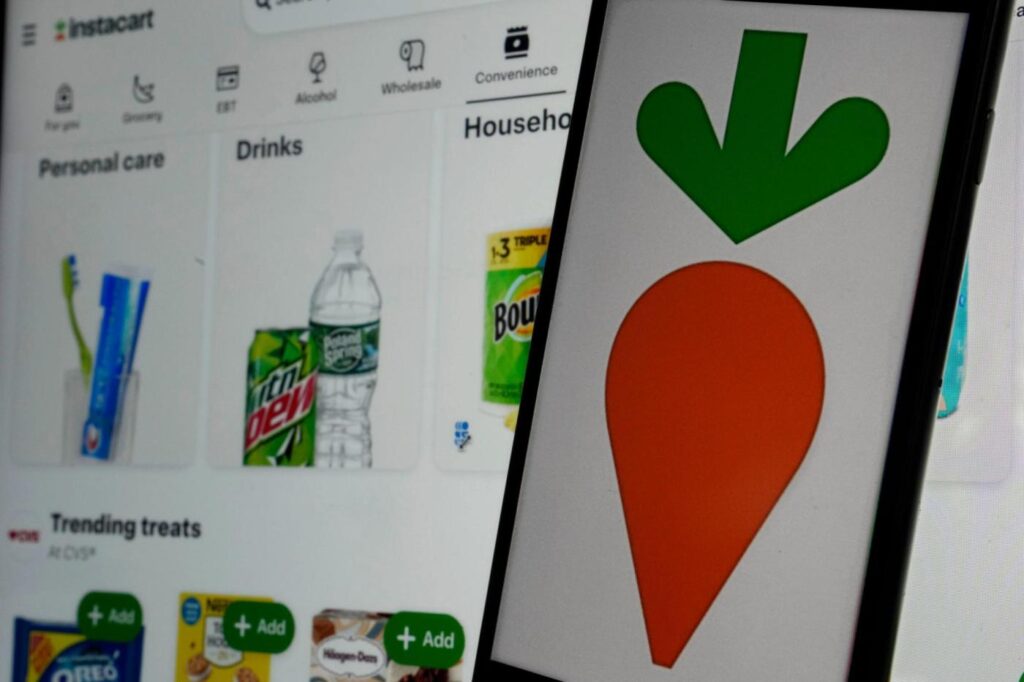
By Dee-Ann Durbin | The Associated Press
Instacart’s shares surged Tuesday in the grocery delivery company’s stock market debut.
The San Francisco-based company’s shares were up about 30% shortly after they started trading on the Nasdaq stock exchange under the ticker symbol “CART.”
Instacart raised $660 million in its initial public offering, selling 22 million shares at $30 apiece. The pricing of the IPO gave Instacart a market value of around $10 billion, significantly lower than the $39 billion value placed on it after a fund-raising round in 2021.
Instacart provides delivery and pickup from 85% of U.S. grocers, or more than 80,000 stores, using a network of 600,000 freelance shoppers. It also provides in-store technology, like smart carts and electronic shelf tags, and sells online ads to food companies and retailers.
It says it has 7.7 million active customers who spend about $317 per month on the platform.
In a letter to investors earlier this month, Instacart CEO Fidji Simo said grocery delivery has tremendous potential. The U.S. grocery market is a $1.1. trillion industry, but only 12% of sales are made online. She said she expects that to at least double over time.
“We have demonstrated our ability to help our retail partners drive strong growth and stay competitive in a complex and increasingly digital industry,” wrote Simo, a former Facebook executive who became Instacart’s CEO in 2021.
The grocery delivery market boomed early in the pandemic. Growth has stabilized, but the market is still about four times larger than it was in 2019, said David Bishop, a partner and lead researcher with Brick Meets Click, a consulting firm that specializes in online grocery shopping.
That market is also increasingly competitive. Instacart faces growing pressure from companies including Uber Eats and DoorDash, which both began delivering groceries in 2020.
As of August, Instacart controlled 70% of the third-party U.S. grocery delivery market, according to YipitData, a market research firm. DoorDash controls around 10%. This week, DoorDash added more U.S. grocers to its offerings, including Cub, Lowe’s Markets and Eataly.
Instacart also faces pressure from grocers themselves, who sometimes bristle at the higher prices Instacart charges or at the pricing rules it puts in place for grocers using its software to run their own websites.
Instacart orders can cost consumers 15% to 20% more than shopping in stores because of delivery fees and product markups, Bishop said.
Some grocers have unwound partnerships with Instacart or built up their own delivery capability. H-E-B, a Texas chain, encourages customers to shop on its own site, not Instacart’s, if they want lower-cost delivery, Bishop said. Other big grocers, like Walmart and Target, also do their own deliveries.
Bishop said Instacart needs to keep its customers coming back because it relies on them to sell ads.
“It’s increasingly difficult to see how Instacart can do that as its competitors are expanding into grocery and grocers are looking more closely at how they can improve the profitability of selling online,” he said.
Food price inflation over the last two years has also dampened demand for delivery in favor of curbside pickup, which is less expensive. U.S. grocery pickup orders grew 3% to $10.5 billion in the April-June period this year compared to the same period a year ago, Bishop said. Grocery delivery orders grew just 1% to $7.8 billion.
Instacart’s orders also slowed in the first half of this year after growing 18% between 2021 and 2022, the company said in its IPO filing.
Still, Instacart’s revenue was up 31% to $1.47 million in the first six months of this year, largely due to increases in the advertising fees it collects from retailers and food companies. The company reported net income of $242 million in the first six months of this year.
Among those bullish about Instacart’s prospects is PepsiCo, which agreed to buy $175 million in convertible preferred stock in a private placement.
The IPO is a long-awaited step for Instacart, which was founded in 2012. The company filed privately for an IPO in May 2022 but delayed those plans last fall when the markets were roiling due to recession fears. There were just 71 IPOs in the U.S. last year, the lowest number since 2009, according to Renaissance Capital.
But a resurgent market is seeing more IPO activity this year. Last week, shares of U.K. chip maker Arm Holdings rose almost 25% in their stock market debut on the Nasdaq, the largest IPO in nearly two years.
Related Articles
FTX sues Sam Bankman-Fried’s parents to claw back funds
Highest savings yields are topping inflation. Here’s why that’s important for savers
5 credit card scams to watch out for this holiday season
Gas prices hit 2023 highs as Russia, Saudi Arabia cut oil supply
Santa Barbara home, right on the harbor, lists for $5 million
